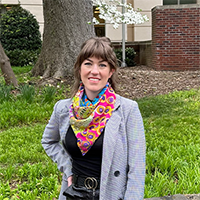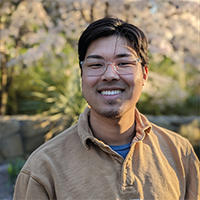by Chris Hilburn-Trenkle
It wouldn’t necessarily be inaccurate to say that Anderson Al Wazni’s award-winning dissertation fellowship was nearly 20 years in the making.
In 2006, Al Wazni received funding through the United States Department of State to spend time in Southeast Asia for work focusing on comparative religion. She traveled around the continent, taking a pilgrimage through India with members of the Jain religion, spending a few weeks at a Buddhist monastery in Taiwan and learning Bengali, the official language of Bangladesh, while studying at a university in Dhaka, Bangladesh.
While Al Wazni, a doctoral student at the University of North Carolina at Chapel Hill School of Social Work, officially began her research on state fragility in the context of climate change years later by examining other nations, her travels in Southeast Asia unofficially opened the door for her later work.
Al Wazni, who plans to graduate from the School of Social Work in 2025, received a dissertation fellowship from the American Association of University Women (AAUW) for her project examining how climate disasters impact vulnerable populations in the United States through the concept of state fragility.
“I was stunned,” said Al Wazni in response to receiving the fellowship. “I was of course hoping, but if you see the people who’ve gotten it before and the types of work that gets rewarded, I would not have been upset if I didn’t (get it) because I recognize it would have gone to a very deserving woman-identified scholar in the field, so good for her … It felt great.”
Al Wazni’s project is developed into three separate papers. The first paper will focus on three prominent measurements associated with state fragility — public services, infrastructure and state legitimacy — to examine different regions of the United States that show fragility, especially relating to forcible displacement due to natural disasters.
Although Al Wazni notes that state fragility is usually reserved for underdeveloped countries, she’s redefining the measurements to apply to the United States more readily. While the United States does not have widespread violent conflict as defined by the state fragility index, Al Wazni is sorting through data to examine bullet wounds and other markers in particular regions.
Her second paper involves qualitative interviews with key experts in the field who focus on natural disaster response and professionals in policy or direct service work related to climate change. With the help of those in the field, she will refine an online survey that will serve as the basis of her third paper. Since forced migration is a big factor in calculating state fragility, according to Al Wazni, she is asking for 200 to 300 respondents who were forcibly displaced due to a natural disaster over the last decade.
“I’m saying that climate change is pouring gas on a fire,” Al Wazni said. “We have this fire of inequity that is already there, and as long as you don’t address climate change it’s going to get worse and worse. I think that disasters are a really good window into seeing where that state service delivery and that trust is not doing a fantastic job currently.”
It was nearly 20 years ago when Al Wazni was traveling in Southeast Asia as a religious studies major from North Carolina State University seeing the real-world effects of climate change. Today, the AAUW is recognizing the potential of her project that could help alleviate the suffering of those affected by natural disasters around the world, from Bangladesh to the United States.
Related Stories

MSW student, Peace Rotary Fellow set to begin next chapter
Alexandra Rose had her eye on the Rotary Peace Fellowship for some time when she came across the University of North Carolina at Chapel Hill School of Social Work’s website.

MSW Student Jacob Hoyt receives equity and inclusion student award
Master of Social Work student Jacob Hoyt was among five recipients who received a 2024 Equity and Inclusion Student Award from the National Association of Social Workers North Carolina Chapter (NASW-NC).

